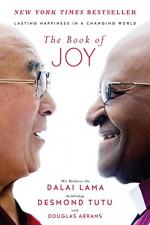
|
| Name: _________________________ | Period: ___________________ |
This test consists of 15 multiple choice questions and 5 short answer questions.
Multiple Choice Questions
1. Abrams writes that generosity is not just about giving money but also about giving which of the following?
(a) Attention.
(b) Patience.
(c) Time.
(d) Forgiveness.
2. What does Abrams mention his wife's profession is?
(a) She is in an integrative physician.
(b) She is a history professor.
(c) She is a nurse.
(d) She is a lawyer.
3. Which part of the brain do some researchers think gratitude stimulates?
(a) The frontal cortex.
(b) The hypothalamus.
(c) The medulla oblongata.
(d) The amygdala.
4. What key paradox of Buddhism does Abrams point out in the section titled Acceptance: The Only Place?
(a) We strive to be happy, but we often are sad.
(b) We are only as trustworthy as our ancestors were.
(c) We need goals to grow as people, but we should not become overly attached to our own aspirations.
(d) Sometimes the need for connection drives us to spend more time alone.
5. What does Edith Eva Eger say was the only think that kept people in the WWII concentration camps alive?
(a) Work.
(b) Food.
(c) The acceptance of the reality of one's situation and the attempt to form the best response.
(d) Spiritual guidance.
6. Which primatologist believes that peace-making activities are extremely common in the animal kingdom?
(a) Jane Goodall.
(b) Rachel Carson.
(c) Frans de Waal.
(d) Francine Waters.
7. What phrase of the Dalai Lama's regarding handling difficulties in life is Abrams particularly struck by in Part III?
(a) Passing through difficulties.
(b) Rising to the occasion.
(c) Finding your inner strength.
(d) Handling the stone.
8. Who was a college classmate of Abrams's who was killed in South Africa?
(a) Amy Biehl.
(b) Robin Gillson.
(c) Gene Rowland.
(d) Mary Robinson.
9. How old was the Dalai Lama when he escaped from Tibet to India?
(a) 24.
(b) 16.
(c) 30.
(d) 20.
10. How does Abrams's friend Daniel Goldman characterize the Dalai Lama's attitude towards life?
(a) He says the Dalai Lama seems amused by everything going on around him.
(b) He says the Dalai Lama is a great mentor.
(c) He says the Dalai Lama will is a channel for peace.
(d) He says the Dalai Lama is very focused on prayer.
11. In Part III, what does Abrams say the Archbishop's trip to India is bookended by?
(a) Birthday parties.
(b) Graduations.
(c) Weddings.
(d) Funerals.
12. What is the dessert that the Dalai Lama most enjoys?
(a) Tibetan rice pudding.
(b) Blueberry pie.
(c) Lemon meringue pie.
(d) Chocolate cake.
13. Who does Archbishop say is good at keeping him humble?
(a) His daughter.
(b) His father.
(c) His brother.
(d) His wife.
14. According to Abrams, what is generosity the natural outgrowth of?
(a) Power.
(b) Sadness.
(c) Forgiveness.
(d) Compassion.
15. The Dalai Lama references a study in Part III that linked a greater risk of heart attack to which of the following?
(a) The conversational use of I, me, and mine.
(b) The lack of exercise common in Western cultures.
(c) Watching too much television.
(d) The eating of red meat.
Short Answer Questions
1. What book did Archbishop Tutu and his daughter write about forgiveness?
2. What does the Dalai Lama say he goes through when he prays five times each day?
3. What injury does Abrams say his own father suffered recently?
4. What does Abrams say acceptance is the opposite of?
5. What does the Dalai Lama say forgiveness does not include?
|
This section contains 544 words (approx. 2 pages at 300 words per page) |

|




